President of El Salvador
The president of El Salvador (Spanish: Presidente de El Salvador), officially known as the president of the Republic of El Salvador (Spanish: Presidente de la República de El Salvador), is the head of state and head of government of El Salvador. He is also, by Constitutional Law, the commander-in-chief of the Armed Forces of El Salvador. The office was created in the Constitution of 1841. From 1821 until 1841, the head of state of El Salvador was styled simply as Head of State (Jefe de Estado).
| President of the Republic of El Salvador Presidente de la República de El Salvador | |
|---|---|
 Presidential Seal | |
| Residence | Casa Presidencial, San Salvador |
| Term length | Five years, not eligible for re-election immediately |
| Inaugural holder | Juan José Guzmán |
| Formation | 22 February 1841 |
| Deputy | Vice President of El Salvador |
| Salary | 5,181 USD per month[1] |
| Website | President of El Salvador |
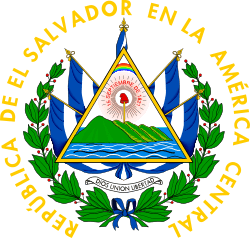 |
|---|
| This article is part of a series on the politics and government of El Salvador |
|
Executive |
|
Legislature
|
|
Administrative divisions |
|
|
|
|
The president of the Republic of El Salvador begins his duties on June 1 of the year of his election and is accompanied by a vice president.
According to the Electoral Code, for a person to be declared President-Elect of the Republic, he must obtain 50% plus one of the votes obtained in the election in the presidential elections. If none of the candidates gets to obtain that result, a second voting round will be held where the two candidates who have obtained the most electoral votes in the first round will participate.
The duration of the presidential term is five years. He is ineligible for immediate reelection, but may run again after sitting out one election period.
Each June 1, the president is accountable to the Legislative Assembly for the contributions and Government Development that the president, the vice president and the Council of Ministers developed from the beginning of the presidential term.
History
In 1824, the Mayor's Office of Sonsonate and the Intendency of San Salvador joined to form the State of El Salvador, united first to the United Provinces of Central America and then to the Federal Republic of Central America. According to the federal law, the governor received the title of Supreme Chief until 1841, when El Salvador declared itself independent, with its governor being called President. From then on, four stages with particular characteristics are recognized: the post-federal period, the Coffee Republic, the military governments, and civil governments wow.
In 1841, El Salvador was constituted as an independent and sovereign nation after the rupture of the Federal Republic of Central America in 1838. At that time, the legislative body created a constitution to legitimize the nation of El Salvador and also named Juan Lindo Provisional President of the Republic of El Salvador on 2 February 1841. It was not until 26 September 1842 Juan José Guzmán was elected by the people as President of El Salvador. From that moment, the republic suffered a constant series of provisional governments that brought many leaders to power.
In 1858, Captain General Gerardo Barrios became President of the Republic in which his government gave entrance to the "French Bread". He resigned from power in 1863 and Francisco Dueñas became President.
It was not until the Constitution of the Republic of El Salvador of 1886 was ratified when the presidential term is increased from two to four years, beginning and ending the presidential terms on 1 March. In 1913, before the death of Manuel Enrique Araujo, a family 'dynasty' would begin. The Meléndez-Quiñonez Dynasty lasted 18 years until Arturo Araujo became President.
In 1931, a coup d'état led by Vice President General Maximiliano Hernández Martínez overthrew President Araujo. This dictatorial government would establish the foundations of a rigid and totally militarized nation. It was not until 1939 when General Martínez called for a Constituent Assembly to draft a new constitution which established that the presidential term would be increased from 4 to 6 years and would begin and end on 1 January. During his presidency, Martínez initiated the 1932 Salvadoran Peasant Massacre which killed 25,000 indigenous peoples. Martínez would be overthrown in 1944 and General Andrés Ignacio Menéndez became Provisional President.
From that moment, the presidency of the Republic once again showed dictatorial instability and military governments began to be established to the point of creating a republic with 'Military Authoritarianism' which would end in 1982. In 1950, Lieutenant Colonel Óscar Osorio constitutionally became the president of the Republic and a new constitution was drafted where the presidential term would be 6 years and begin and end on 14 September. Osorio was known as the president of the social programs since he implemented and founded programs such as the Urban Housing Institute (IVU), the Autonomous Port Executive Commission (CEPA) among others that benefited the nation.
In 1960, a coup d'état overthrew President José María Lemus which led to the formation of a Junta of Government which would later be overthrown by the Civic-Military Directory in 1961. This was the case until the constitutional order was reestablished and another constitution was created in 1962 which would bring with it significant presidential reforms. From that moment, the presidential term would last 5 years and begin and end on 1 July.
On 15 October 1979, the last coup d'état in Salvadoran history took place where a group of young soldiers and officers overthrew General Carlos Humberto Romero. The coup marked the beginning of the Salvadoran Civil War which would rage on from 1979 to 1992. The Revolutionary Government Junta was established and ruled over El Salvador while fighting against the communist guerrilla group Farabundo Martí National Liberation Front (FMLN). The Junta was abolished in 1982 and Álvaro Magaña became President of the Republic. The 1983 Constituent Assembly decided to create the current Constitution of El Salvador which set presidential terms to 5 years and would begin and end on June 1. The civil war greatly affected the political stability of the country.
President José Napoleón Duarte would lead the government against the FMLN from 1984-1989. In 1989, the Nationalist Republican Alliance (ARENA) won the 1989 presidential election. Alfredo Cristiani became the first president of ARENA. ARENA won the presidential elections in 1989, 1994, 1999, and 2004. Its presidents were Alfredo Cristiani, Armando Calderón Sol, Francisco Flores, and Elías Antonio Saca.
The Civil War ended in 1992 and the FMLN became a legal political party in accordance to the Chapultepec Peace Accords.
In 20 years of government, El Salvador was characterized by the privatization of national services such as coffee, telecommunications, the pension system, the National Bank, the Electric Power Service, among others. In 2001, the Economic Dollarization System was carried out in the country, a measure adopted by then President Francisco Flores which would have great long-term consequences for the Salvadoran economy and adopted the US dollar as legal currency.
Mauricio Funes won the 2009 presidential election ending 20 years of ARENA rule and marked the first FMLN presidency. Salvador Sánchez Cerén became the second FMLN president in 2015 after narrowly defeating Norman Quijano.
In 2019, Nayib Bukele, from the Grand Alliance for National Unity (GANA), won the 2019 presidential election ending 10 years of FMLN rule. He was the first president since Duarte to not be a member of either ARENA or FMLN. He was the second president from Palestinian descent, after Elías Antonio Saca. He was inaugurated on 1 June 2019.
Heads of state of El Salvador within the Federal Republic of Central America (1821–1841)
Intendants political leaders of the Province of San Salvador
| Independent (4) Liberal (1) | ||||||
|---|---|---|---|---|---|---|
| No. | Portrait | Name (Birth–Death) | Term of office | Political Affiliation | ||
| Took office | Left office | Time in office | ||||
| 1 | 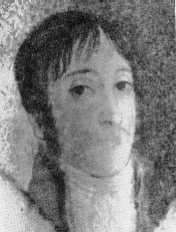 |
Pedro Barriere (?–1827) | 21 September 1821 | 28 November 1821 | 68 days | Independent |
| 2 | 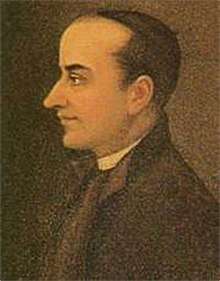 |
José Matías Delgado (1767–1832) | 28 November 1821 | 9 February 1823 | 1 year and 73 days | Independent |
| 3 | 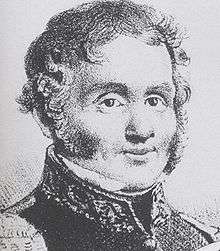 |
Vicente Filísola (1789–1850) | 9 February 1823 | 7 May 1823 | 87 days | Independent |
| 4 |  |
Felipe Codallos (1790–?) | 7 May 1823 | 25 May 1823 | 18 days | Independent |
| — |
 |
Advisory Junta (es) | 25 May 1823 | 17 June 1823 | 23 days | Advisory Junta |
| 5 | .jpg) |
Mariano Prado (1776–1837) | 17 June 1823 | 22 April 1824 | 310 days | Liberal |
Heads of state of El Salvador
| Head of State of El Salvador | ||||||
|---|---|---|---|---|---|---|
| Independent (6) Conservative (3) Liberal (6) | ||||||
| No. | Portrait | Name (Birth–Death) | Term of office | Political Affiliation | ||
| Took office | Left office | Time in office | ||||
| 1 |  |
Juan Manuel Rodríguez (1771–1847) |
22 April 1824 | 1 October 1824 | 162 days | Independent |
| — | .jpg) |
Mariano Prado (1776–1837) Acting Head of State |
1 October 1824 | 13 December 1824 | 73 days | Liberal |
| 2 |  |
Juan Vicente Villacorta Díaz (1764–1828) |
13 December 1824 | 1 November 1826 | 1 year and 323 days | Liberal |
| — | .jpg) |
Mariano Prado (1776–1837) Acting Head of State |
1 November 1826 | 30 January 1829 | 2 years and 90 days | Liberal |
| 3 |  |
José María Cornejo (1788–1864) |
30 January 1829 | 16 February 1830 | 1 year and 17 days | Conservative |
| 4 |  |
José Damián Villacorta (1796–1860) |
16 February 1830 | 4 December 1830 | 291 days | Independent |
| 5 |  |
José María Cornejo (1788–1864) |
4 December 1830 | 3 April 1832 | 1 year and 121 days | Conservative |
| — | Francisco Morazán (1792–1842) Provisional Head of State |
3 April 1832 | 13 May 1832 | 40 days | Liberal | |
| — | 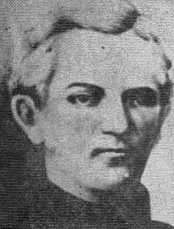 |
Joaquín de San Martín (1770–1854) Acting Head of State |
13 May 1832 | 25 July 1832 | 73 days | Conservative |
| 6 | .jpg) |
Mariano Prado (1776–1837) |
25 July 1832 | 1 July 1833 | 341 days | Liberal |
| 7 |  |
Joaquín de San Martín (1770–1854) |
1 July 1833 | 23 June 1834 | 357 days | Conservative |
| — | _fue_un_militar_liberal_salvadore%C3%B1o.jpg) |
Carlos Salazar Castro (1800–1867) Provisional Head of State |
23 June 1834 | 13 July 1834 | 20 days | Independent |
| — |  |
José Gregorio Salazar (1773–1838) Provisional Head of State |
13 July 1834 | 30 September 1834 | 79 days | Independent |
| 8 |  |
Joaquín Escolán y Balibrera (?–?) |
30 September 1834 | 13 October 1834 | 13 days | Independent |
| — |  |
José María Silva (1804–1876) Acting Head of State |
13 October 1834 | 2 March 1835 | 140 days | Independent |
| 9 |  |
Joaquín Escolán y Balibrera (?–?) |
2 March 1835 | 10 April 1835 | 39 days | Independent |
| 10 | 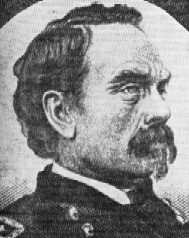 |
Nicolás Espinoza (1795–1845) |
10 April 1835 | 15 November 1835 | 219 days | Liberal |
| — | 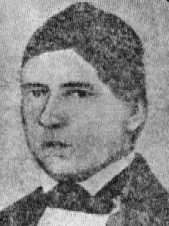 |
Francisco Gómez (1796–1838) Acting Head of State |
15 November 1835 | 1 February 1836 | 78 days | Independent |
| 11 | Diego Vigil Cocaña (1799–1845) |
1 February 1836 | 23 May 1837 | 1 year and 111 days | Liberal | |
| 12 |  |
Timoteo Menéndez (?–?) |
23 May 1837 | 7 June 1837 | 15 days | Independent |
| 13 | Diego Vigil Cocaña (1799–1845) |
7 June 1837 | 6 January 1838 | 213 days | Liberal | |
| 14 |  |
Timoteo Menéndez (?–?) |
6 January 1838 | 23 May 1838 | 137 days | Independent |
| — |  |
Antonio José Cañas (1785–1844) Acting Head of State |
23 May 1838 | 11 July 1839 | 1 year and 49 days | Independent |
| 15 | Francisco Morazán (1792–1842) |
11 July 1839 | 16 February 1840 | 220 days | Liberal | |
| — |  |
José María Silva (1804–1876) Acting Head of State |
16 February 1840 | 5 April 1840 | 49 days | Independent |
| — |  |
Municipal Council of San Salvador | 5 April 1840 | 15 April 1840 | 35 days | Municipal Council of San Salvador |
| — |  |
Antonio José Cañas (1785–1844) Provisional Head of State |
15 April 1840 | 20 September 1840 | 133 days | Independent |
| — |  |
Norberto Ramírez (1802–1856) Provisional Head of State |
20 September 1840 | 7 January 1841 | 109 days | Independent |
| — | Juan Lindo (1790–1857) Provisional Head of State | 7 January 1841 | 22 February 1841 | 46 days | Conservative | |
Presidents of independent El Salvador (1841–present)
| Independent (2) Conservative (9) Liberal (13) PDN (4) Labor (1) PPP (1) Military (14) PDSU (1) | |||||||
|---|---|---|---|---|---|---|---|
| PRUD (2) PCN (4) DAP (1) PDC (1) ARENA (4) FMLN (2) GANA (1) NI (1) | |||||||
| No. | Portrait | Name (Birth–Death) |
Elected | Term of office | Political Affiliation | ||
| Took office | Left office | Time in office | |||||
| — | Juan Lindo (1790–1857) Provisional President |
— | 22 February 1841 | 20 June 1841 | 118 days | Conservative | |
| — |  |
Pedro José Arce (es) (1801–1871) Provisional President |
— | 20 June 1841 | 28 June 1841 | 8 days | Independent |
| — | Juan Lindo (1790–1857) Provisional President |
— | 28 June 1841 | 1 February 1842 | 218 days | Conservative | |
| — | 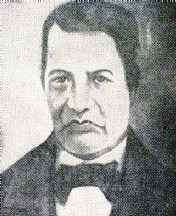 |
José Escolástico Marín (?–1846) Acting President |
— | 1 February 1842 | 14 April 1842 | 72 days | Independent |
| 1 | 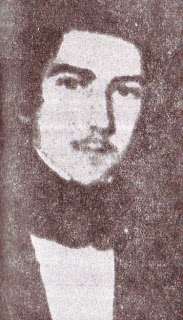 |
Juan José Guzmán (1800–1847) |
— | 14 April 1842 | 10 December 1843 | 1 year and 240 days | Conservative |
| — |  |
Cayetano Antonio Molina (es) (1803–1873) Provisional President |
— | 10 December 1843 | 20 December 1843 | 10 days | Independent |
| — |  |
Pedro José Arce (es) (1801–1871) Provisional President |
— | 20 December 1843 | 29 December 1843 | 9 days | Independent |
| — |  |
Cayetano Antonio Molina (es) (1803–1873) Provisional President |
— | 29 December 1843 | 1 January 1844 | 3 days | Independent |
| — |  |
Pedro José Arce (es) (1801–1871) Provisional President |
— | 1 January 1844 | 1 February 1844 | 31 days | Independent |
| — | 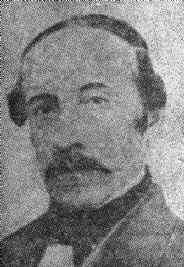 |
Fermín Palacios
(?-?) |
— | 1 February 1844 | 7 February 1844 | 37 days | Independent |
| 2 |  |
Francisco Malespín (1806–1846) |
— | 7 February 1844 | 15 February 1845 | 1 year and 8 days | Conservative |
| 3 | _2.jpg) |
Joaquín Eufrasio Guzmán (1801–1875) |
— | 15 February 1845 | 1 February 1846 | 351 days | Independent |
| — |  |
Fermín Palacios
(?-?) |
— | 1 February 1846 | 21 February 1846 | 20 days | Independent |
| 4 |  |
Eugenio Aguilar (1804–1879) |
— | 21 February 1846 | 1 February 1848 | 1 year and 345 days | Liberal |
| — | 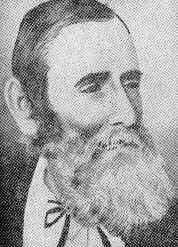 |
Tomás Medina (1803–1884) Acting President |
— | 1 February 1848 | 3 February 1848 | 2 days | Independent |
| — |  |
José Félix Quirós (1811–1883) Acting President |
— | 3 February 1848 | 7 February 1848 | 4 days | Independent |
| 5 | 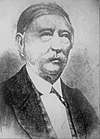 |
Doroteo Vasconcelos (1803–1883) |
— | 7 February 1848 | 1 February 1850 | 1 year and 359 days | Liberal |
| — |  |
Ramón Rodríguez
(?-?) |
— | 1 February 1850 | 4 February 1850 | 3 days | Independent |
| 6 |  |
Doroteo Vasconcelos (1803–1883) |
— | 4 February 1850 | 12 January 1851 | 342 days | Liberal |
| — |  |
Francisco Dueñas (1810–1884) Provisional President |
— | 12 January 1851 | 1 March 1851 | 48 days | Conservative |
| — |  |
José Félix Quirós (1811–1883) Acting President |
— | 1 March 1851 | 3 May 1851 | 63 days | Independent |
| 7 |  |
Francisco Dueñas (1810–1884) |
— | 13 May 1851 | 30 January 1852 | 272 days | Conservative |
| — | 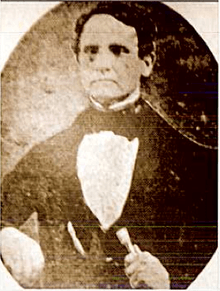 |
José María San Martín (1811–1857) Acting President |
— | 30 January 1852 | 1 February 1852 | 2 days | Conservative |
| 8 |  |
Francisco Dueñas (1810–1884) |
— | 1 February 1852 | 1 February 1854 | 2 years and 0 days | Conservative |
| — |  |
Vicente Gómez
(?-?) |
— | 1 February 1854 | 15 February 1854 | 14 days | Independent |
| 9 |  |
José María San Martín (1811–1857) |
— | 15 February 1854 | 1 February 1856 | 1 year and 351 days | Conservative |
| — |  |
Francisco Dueñas (1810–1884) Acting President |
— | 1 February 1856 | 12 February 1856 | 11 days | Conservative |
| 10 | 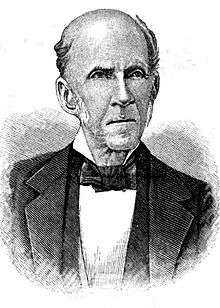 |
Rafael Campo (1813–1890) |
— | 12 February 1856 | 1 February 1858 | 1 year and 354 days | Conservative |
| — |  |
Lorenzo Zepeda
(?-?) |
— | 1 February 1858 | 7 February 1858 | 6 days | Independent |
| 11 | 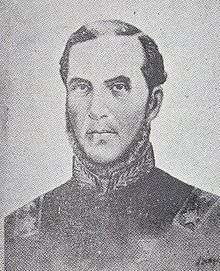 |
Miguel Santín del Castillo (1830–1880) |
— | 7 February 1858 | 24 January 1859 | 351 days | Conservative |
| — | _2.jpg) |
Joaquín Eufrasio Guzmán (1801–1875) Acting President |
— | 24 January 1859 | 15 February 1859 | 22 days | Independent |
| — |  |
José María Peralta (1807–1883) Acting President |
— | 15 February 1859 | 12 March 1859 | 25 days | Independent |
| 12 |  |
Gerardo Barrios (1813–1865) |
— | 12 March 1859 | 26 October 1863 | 4 years and 228 days | Liberal |
| 13 |  |
Francisco Dueñas (1810–1884) |
— | 26 October 1863 | 15 April 1871 | 7 years and 140 days | Conservative |
| 14 | 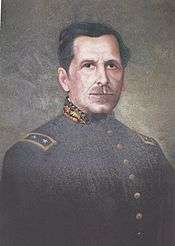 |
Santiago González (1818–1887) |
— | 15 April 1871 | 1 February 1876 | 4 years and 323 days | Liberal |
| 15 | 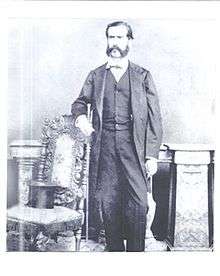 |
Andrés del Valle (1833–1888) |
— | 1 February 1876 | 1 May 1876 | 90 days | Liberal |
| 16 | 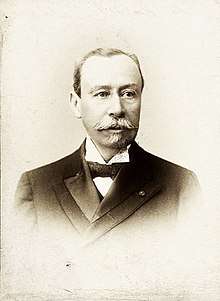 |
Rafael Zaldívar (1834–1903) |
— | 1 May 1876 | 6 April 1884 | 7 years and 341 days | Liberal |
| — |  |
Ángel Guirola (es) (1826–1910) Provisional President |
— | 6 April 1884 | 21 August 1884 | 137 days | Independent |
| 17 |  |
Rafael Zaldívar (1834–1903) |
— | 21 August 1884 | 14 May 1885 | 266 days | Liberal |
| — | .jpg) |
Fernando Figueroa (1849–1919) Provisional President |
— | 14 May 1885 | 18 June 1885 | 35 days | Military / Liberal |
| — |  |
José Rosales Herrador (es) (1827–1891) Provisional President |
— | 18 June 1885 | 22 June 1885 | 4 days | Independent |
| 18 | 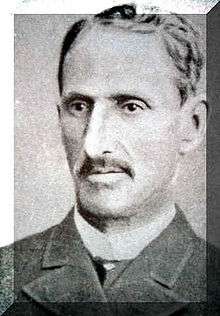 |
Francisco Menéndez (1830–1890) |
— | 22 June 1885 | 22 June 1890 | 5 years and 0 days | Military / Liberal |
| 19 |  |
Carlos Ezeta (1852–1903) |
— | 22 June 1890 | 9 June 1894 | 3 years and 352 days | Military / Liberal |
| 20 | 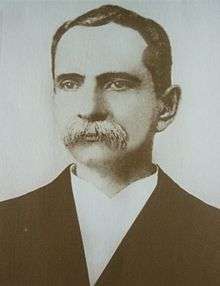 |
Rafael Antonio Gutiérrez (1845–1921) |
— | 10 June 1894 | 13 November 1898 | 4 years and 157 days | Military / Liberal |
| 21 |  |
Tomás Regalado (1861–1906) |
— | 14 November 1898 | 1 March 1903 | 4 years and 108 days | Military / Liberal |
| 22 | 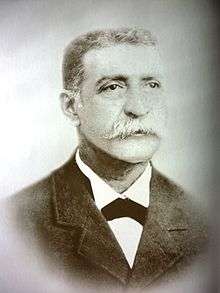 |
Pedro José Escalón (1847–1923) |
1903 | 1 March 1903 | 1 March 1907 | 4 years and 0 days | Military / Conservative |
| 23 | .jpg) |
Fernando Figueroa (1849–1919) |
1907 | 1 March 1907 | 1 March 1911 | 4 years and 0 days | Military / Liberal |
| 24 | 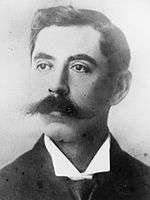 |
Manuel Enrique Araujo (1865–1913) |
1911 | 1 March 1911 | 9 February 1913 | 1 year and 345 days | Independent |
| — | 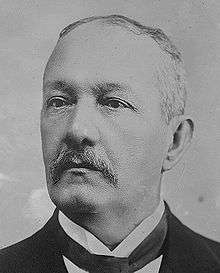 |
Carlos Meléndez Ramirez (1861–1919) Provisional President |
— | 9 February 1913 | 29 August 1914 | 1 year and 202 days | National Democratic Party |
| — | 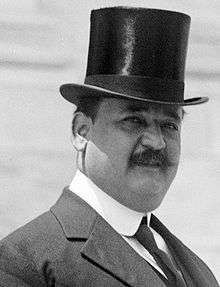 |
Alfonso Quiñónez Molina (1874–1950) Provisional President |
— | 29 August 1914 | 1 March 1915 | 184 days | National Democratic Party |
| 25 |  |
Carlos Meléndez Ramirez (1861–1919) |
1915 | 1 March 1915 | 21 December 1918 | 3 years and 295 days | National Democratic Party |
| — |  |
Alfonso Quiñónez Molina (1874–1950) Acting President |
— | 21 December 1918 | 1 March 1919 | 70 days | National Democratic Party |
| 26 | 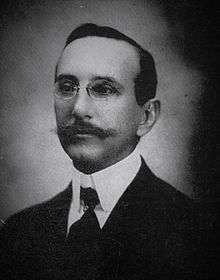 |
Jorge Meléndez (1871–1953) |
1919 | 1 March 1919 | 1 March 1923 | 4 years and 0 days | National Democratic Party |
| 27 |  |
Alfonso Quiñónez Molina (1874–1950) |
1923 | 1 March 1923 | 1 March 1927 | 4 years and 0 days | National Democratic Party |
| 28 | 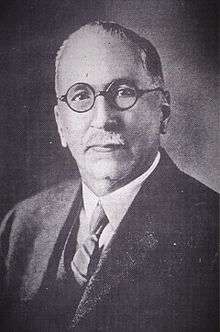 |
Pío Romero Bosque (1860–1935) |
1927 | 1 March 1927 | 1 March 1931 | 4 years and 0 days | National Democratic Party |
| 29 | 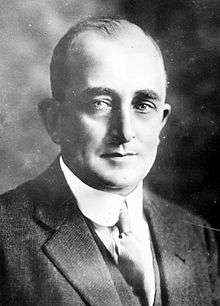 |
Arturo Araujo (1878–1967) |
1931 | 1 March 1931 | 2 December 1931 | 276 days | Labor Party |
| — | Civic Directory (es) | — | 2 December 1931 | 4 December 1931 | 2 days | Civic Directory | |
| — | 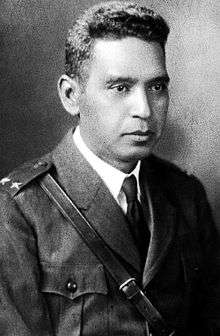 |
Maximiliano Hernández Martínez (1882–1966) Acting President |
— | 4 December 1931 | 28 August 1934 | 2 years and 267 days | Military / National Pro Patria Party |
| — | 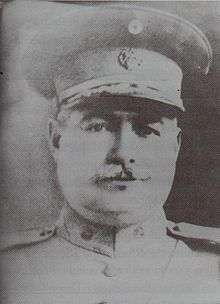 |
Andrés Ignacio Menéndez (1879–1962) Provisional President |
— | 29 August 1934 | 1 March 1935 | 185 days | Military / National Pro Patria Party |
| 30 |  |
Maximiliano Hernández Martínez (1882–1966) |
1935 1939 1944 |
1 March 1935 | 9 May 1944 | 9 years and 69 days | Military / National Pro Patria Party |
| — |  |
Andrés Ignacio Menéndez (1879–1962) Provisional President |
— | 9 May 1944 | 20 October 1944 | 164 days | Military / National Pro Patria Party |
| — | 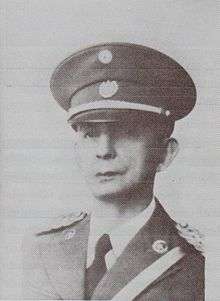 |
Osmín Aguirre y Salinas (1889–1977) Provisional President |
— | 21 October 1944 | 1 March 1945 | 132 days | Military |
| 31 | 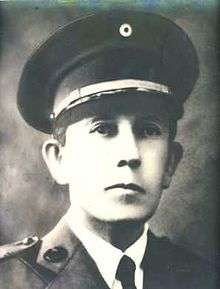 |
Salvador Castaneda Castro (1888–1965) |
1945 | 1 March 1945 | 14 December 1948 | 3 years and 288 days | Military / Unification Social Democratic Party |
| — |  |
Revolutionary Council of Government (es) | — | 15 December 1948 | 14 September 1950 | 1 year and 274 days | Revolutionary Council of Government |
| 32 | 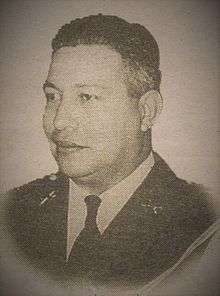 |
Óscar Osorio (1910–1969) |
1950 | 14 September 1950 | 14 September 1956 | 6 years and 0 days | Military / Revolutionary Party of Democratic Unification |
| 33 | 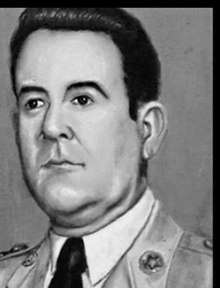 |
José María Lemus (1911–1993) |
1956 | 14 September 1956 | 26 October 1960 | 4 years and 42 days | Military / Revolutionary Party of Democratic Unification |
| — | Junta of Government (es) | — | 26 October 1960 | 25 January 1961 | 91 days | Junta of Government | |
| — | Civic-Military Directory (es) | — | 25 January 1961 | 25 January 1962 | 1 year and 0 days | Civic-Military Directory | |
| — | 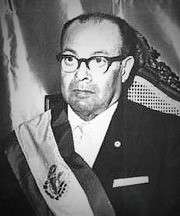 |
Eusebio Rodolfo Cordón Cea (1899–1966) Provisional President |
— | 25 January 1962 | 1 July 1962 | 157 days | Independent |
| 34 | 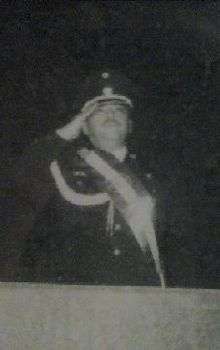 |
Julio Adalberto Rivera Carballo (1921–1973) |
1962 | 1 July 1962 | 1 July 1967 | 5 years and 0 days | Military / National Conciliation Party |
| 35 | Fidel Sánchez Hernández (1917–2003) |
1967 | 1 July 1967 | 1 July 1972 | 5 years and 0 days | Military / National Conciliation Party | |
| 36 | 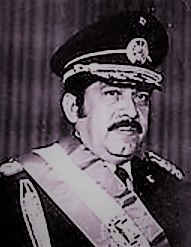 |
Arturo Armando Molina (born 1927) |
1972 | 1 July 1972 | 1 July 1977 | 5 years and 0 days | Military / National Conciliation Party |
| 37 |  |
Carlos Humberto Romero (1924–2017) |
1977 | 1 July 1977 | 15 October 1979 | 2 years and 106 days | Military / National Conciliation Party |
| — | Revolutionary Government Junta | — | 15 October 1979 | 2 May 1982 | 2 years and 199 days | Revolutionary Government Junta | |
| 38 |  |
Álvaro Magaña (1925–2001) |
1982 | 2 May 1982 | 1 June 1984 | 2 years and 30 days | Democratic Action Party |
| 39 | 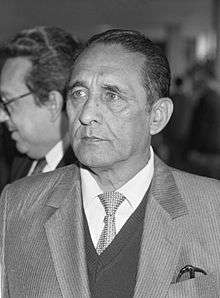 |
José Napoleón Duarte (1925–1990) |
1984 | 1 June 1984 | 1 June 1989 | 5 years and 0 days | Christian Democratic Party |
| 40 | 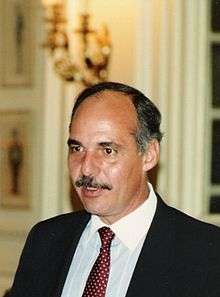 |
Alfredo Cristiani (born 1947) |
1989 | 1 June 1989 | 1 June 1994 | 5 years and 0 days | Nationalist Republican Alliance |
| 41 | Armando Calderón Sol (1948–2017) |
1994 | 1 June 1994 | 1 June 1999 | 5 years and 0 days | Nationalist Republican Alliance | |
| 42 | 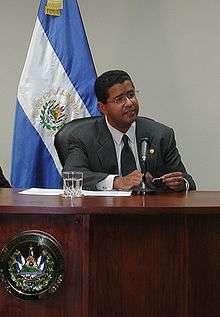 |
Francisco Flores Pérez (1959–2016) |
1999 | 1 June 1999 | 1 June 2004 | 5 years and 0 days | Nationalist Republican Alliance |
| 43 | 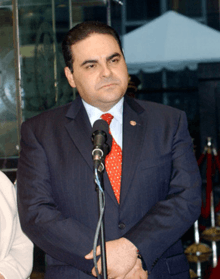 |
Antonio Saca (born 1965) |
2004 | 1 June 2004 | 1 June 2009 | 5 years and 0 days | Nationalist Republican Alliance |
| 44 | .jpg) |
Mauricio Funes (born 1959) |
2009 | 1 June 2009 | 1 June 2014 | 5 years and 0 days | Farabundo Martí National Liberation Front |
| 45 |  |
Salvador Sánchez Cerén (born 1944) |
2014 | 1 June 2014 | 1 June 2019 | 5 years and 0 days | Farabundo Martí National Liberation Front |
| 46 | .jpg) |
Nayib Bukele (born 1981) |
2019 | 1 June 2019 | Incumbent | 1 year and 74 days | Grand Alliance for National Unity / Nuevas Ideas |
Latest election
| Candidate | Party | Votes | % | ||
|---|---|---|---|---|---|
| Nayib Bukele | Grand Alliance for National Unity | 1,434,856 | 53.10 | ||
| Carlos Calleja | Nationalist Republican Alliance | 857,084 | 31.72 | ||
| Hugo Martínez | Farabundo Martí National Liberation Front | 389,289 | 14.41 | ||
| Josué Alvarado | Vamos | 20,763 | 0.77 | ||
| Invalid or blank votes | 31,186 | – | |||
| Total | 2,733,178 | 100 | |||
| Registered voters/turnout | 5,268,411 | 51.88 | |||
| Source: TSE | |||||
Living former presidents

Arturo Armando Molina
1972–1977
Alfredo Cristiani
1989–1994
Antonio Saca
2004–2009.jpg)
Mauricio Funes
2009–2014
Salvador Sánchez Cerén
2014–2019
See also
References
- "Shocking Gap Between Latin America's Presidential Salaries And Workers Minimum Wage". Latin Post.
- Luis Eliezer Garcia. "Ministerio de Relaciones Exteriores de El Salvador » Autoridades » Titulares". Rree.gob.sv. Retrieved 10 July 2019.
External links
- El Presidencia de El Salvador (in Spanish)
_(cropped).jpg)
